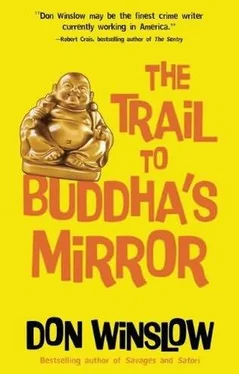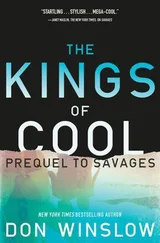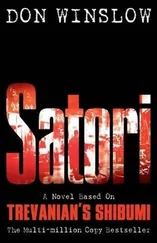Don Winslow - The Trail to Buddha_s Mirror
Здесь есть возможность читать онлайн «Don Winslow - The Trail to Buddha_s Mirror» весь текст электронной книги совершенно бесплатно (целиком полную версию без сокращений). В некоторых случаях можно слушать аудио, скачать через торрент в формате fb2 и присутствует краткое содержание. Жанр: Триллер, на английском языке. Описание произведения, (предисловие) а так же отзывы посетителей доступны на портале библиотеки ЛибКат.
- Название:The Trail to Buddha_s Mirror
- Автор:
- Жанр:
- Год:неизвестен
- ISBN:нет данных
- Рейтинг книги:3 / 5. Голосов: 1
-
Избранное:Добавить в избранное
- Отзывы:
-
Ваша оценка:
- 60
- 1
- 2
- 3
- 4
- 5
The Trail to Buddha_s Mirror: краткое содержание, описание и аннотация
Предлагаем к чтению аннотацию, описание, краткое содержание или предисловие (зависит от того, что написал сам автор книги «The Trail to Buddha_s Mirror»). Если вы не нашли необходимую информацию о книге — напишите в комментариях, мы постараемся отыскать её.
The Trail to Buddha_s Mirror — читать онлайн бесплатно полную книгу (весь текст) целиком
Ниже представлен текст книги, разбитый по страницам. Система сохранения места последней прочитанной страницы, позволяет с удобством читать онлайн бесплатно книгу «The Trail to Buddha_s Mirror», без необходимости каждый раз заново искать на чём Вы остановились. Поставьте закладку, и сможете в любой момент перейти на страницу, на которой закончили чтение.
Интервал:
Закладка:
Yeah, good. Except I don’t know if I want to kill you or love you. Get out of here or stay here with you.
“So what’s your story?” he asked.
Li Lan
My mother’s family were rich landowners in Hunan Province, very important members of the Nationalist Party, the Kuomintang.
Mother grew up in privileged household, cultured… genteel. Her parents were very progressive. They believed that boys and girls should be equal. And they thought that China must become modernized. So they sent their oldest son to England, the youngest son to France, and the middle daughter to America. Middle Daughter was my mother. So as a young girl, just seventeen, she traveled to America, to Smith College.
But she did not stay very long. The Japanese invaded and killed very many Chinese. Mother came home. Her father was very angry with her, very worried. But Mother was patriotic. She ran away to join the fight.
She became a legend. She ran far away from Hunan, north to the area controlled by communist guerrillas. She trained hard in the mountains. She learned to shoot a rifle, to plant a mine, to make a deadly spear from a bamboo stick. Her officers also gave her political indoctrination, and she became a devoted communist. She learned how her own family’s huge landholdings oppressed the masses, and she longed to purge the burning shame of her class background. She became at first a courier, and then a spy. It was a role in which her family background and her education was useful. She spoke beautiful Chinese, and she could understand Japanese and English. Mother could walk among any kind of people and keep her ears open.
Her work was dangerous and she loved it. Every dangerous act was a redemption, every contribution to the war helped to build a new woman in a new China. And she fell in love.
He was a soldier, of course. A guerrilla leader and a brilliant political officer. She met Xao in the mountains when she smuggled a message from an enemy held in a town nearby. He admired first her courage, then her beauty, and then her mind. They went to bed that night. It was her first time, and it was all somehow the same thing: the war, the communist struggle, and Xao Xiyang. She knew their futures would always be together, hers, Xao’s and China’s. The war was long, so long, and after they defeated the Japanese, they began to struggle against the fascist Kuomintang and its leader, Chiang Kai-shek.
In the battle to liberate the country from the Kuomintang, my mother’s background became even more useful. She pretended to become obedient to her father. She went home, she attended parties, she “dated” American officers and spies. All this time she passed information to the Party, many times through her husband, Xao. When the communist forces appeared to be victorious, her family fled to Taiwan, but Mother hid, and stayed behind. She traveled to Beijing and found Father there! They were together on the birthday of the new China. Many times Mother told us the story of how she and Father stood in Tiananmen Square, with thousands of red flags waving in the wind and thousands of people in the square, how they stood there cheering Chairman Mao and weeping with joy as the Chairman declared the People’s Republic of China. Father stayed with the Party and was assigned a government post in Chengdu. Mother became a propaganda officer. I was born two years later, in 1951.
Poor father… he was destined to have only girls. But he did not mind. He loved us very much, and would buy us dresses and pretty things, and tie ribbons in our hair. Blue for me, red for my sister. So we became called Lan Blue and Hong Red. Xao Lan and Xao Hong.
At first, everything was well. We were so happy! Although we were sisters, Hong and I were so different. I was shy, she was very forward. I studied painting and music. Hong studied acrobatics and theater. I liked to walk in countryside, Hong liked to make fight. Mother and Father would joke that perhaps they had daughter and son also. There was much laughter in our house, much laughter and music and art. Great happiness.
Then the bad times came. When Chairman Mao said, “Let a hundred flowers bloom.” That was 1957, when the Chairman invited all people, most especially intellectuals, to criticize the Party.
Mother did so. With enthusiasm. She loved the Party, but she also loved freedom, and she thought that the Party had become too… authoritarian, too “one way.” Mother did not believe in “one way.” She said the world was too large for that. So she taught us everything. Chinese, but English also. Communist thought, but also Jefferson thought, Lincoln thought. Chinese music, but also Mozart. Chinese painting, but also Western painting, Cezanne, Mondrian. So Mother criticized the Parry, thinking that was her duty. She wrote letters to newspapers, she joined the students at Sichuan University who were putting up posters. She even criticized Father for not listening enough! This was also a joke in our house, because after that Father would cook and ask Mother to criticize his soup!
But Hundred Flowers Movement was a trap. It lasted one month only, May to June, one breath of fresh spring air before the doors slammed shut. Those who made criticisms were called traitors, called Rightists, and a new campaign replaced Hundred Flowers Campaign. They called it “Anti-Rightist Campaign.”
The Chairman did not really want free speech. Police suppressed newspapers, silenced speakers, and tore down the posters. Students in Chengdu rioted.
Mother came home in tears. She had seen the police use batons on the students and beat them bloody. Father argued that order had to be restored, and she became very angry with him. That night the police came for her.
We were little and didn’t understand, but we were very frightened. Mother did not return for two days, and when she did, she looked older and sad. We discovered later that the police asked her about her family, accused her of being a Kuomintang spy, waved the letters she had written at her, and ordered her to write out a “confession” of her mistakes. She refused. A week later the police came back and arrested her. Father explained that she had gone back to school to learn more about Mao’s thought. I remember that I asked if I could go to school with her, but Father said that I was too young. Hong wanted to fight the police, of course, but Father said that they had just made a mistake and would correct it soon. Why, Mother was a war hero and a patriot!
Mother was in jail for over a year. We visited her twice, which was all we were allowed. Father helped us get into our prettiest dresses and our ribbons, and get together a bundle of flowers. We went to a big building on the edge of the city. Mother came to a table behind a wire fence, and we took the petals off the flowers and pushed them through the wire to her. I tried not to cry, but I cried. Mother tried not to cry, but she cried. Hong did not cry and Father did not, but he looked sad and angry. I asked Mother what she had done wrong, and she said that she was a Rightist, because her parents were Rightists. I did not know what a Rightist was, but I remember I said that if she was one because her parents were, then I must be a Rightist, too. I remember that Father laughed a harsh laugh, but Mother looked serious and told me that I must never say that, that we children must be good communists and study the thought of Chairman Mao. She said that she was studying hard and had written many confessions, and when she had learned to overcome her own Rightist thought, she could come home and we would be together again.
We were together again, but not at home. Father was sent to the countryside “to help reorganize the peasants,” but really because he refused to divorce Mother, or even denounce her. This was the beginning of the Great Leap Forward, when the land was divided into production brigades, and Father was to educate the peasants about the great changes. We left our apartment in Chengdu and moved to a small village-Dwaizhou. It was very strange to us, very new, and we were frightened. The peasants did not want us there at first, because we were more mouths to feed and we knew nothing about farming. Father worked very hard, though, and learned much, and helped the peasants explain their problems to the Party cadres. The peasants began to respect him, and then love him, because he fought for them and got them equipment, and fertilizer, and medical supplies. He taught classes at night also and conducted political struggle sessions to explain to the people the great goals of the revolution. Mother joined us after a year, and we were so happy! We wore peasant clothes now, and had no pretty dresses, but we were happy to have our mother back. And we could see that Father and Mother were so happy to be together.
Читать дальшеИнтервал:
Закладка:
Похожие книги на «The Trail to Buddha_s Mirror»
Представляем Вашему вниманию похожие книги на «The Trail to Buddha_s Mirror» списком для выбора. Мы отобрали схожую по названию и смыслу литературу в надежде предоставить читателям больше вариантов отыскать новые, интересные, ещё непрочитанные произведения.
Обсуждение, отзывы о книге «The Trail to Buddha_s Mirror» и просто собственные мнения читателей. Оставьте ваши комментарии, напишите, что Вы думаете о произведении, его смысле или главных героях. Укажите что конкретно понравилось, а что нет, и почему Вы так считаете.












